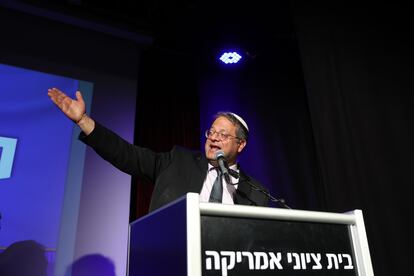Itamar Ben-Gvir, the ultranationalist star of the Israeli elections
The inexorable rise of the candidate highlights the country’s rightward drift. According to polls, the Religious Zionist Party is set to become the third-largest force in the Knesset

Itamar Ben-Gvir takes the stage in Tel Aviv like a rock star, while a song praising him for saying that terrorists are going to die blares out. That is, after all, what he has become ahead of Tuesday’s elections in Israel. Ben-Gvir is the leader of the far-right Otzma Yehudit (Jewish Strength) party, which is one of three groups in the Religious Zionist Party. This group is forecast to become the third-largest political force in the country by increasing their number of seats in the 120-member parliament from six to 15, according to the polls. It matters little that Ben-Gvir is the number two on the list: he is a sensation who eclipses all other debates and even sets the pace for his Arab and center-left detractors. Above all, he is a man who has gone from being a pariah to be avoided in public to a possible minister in charge of the Israeli police, if he is able to form a government with Benjamin Netanyahu’s opposition Likud and the ultra-Orthodox parties. Ben-Gvir’s ultranationalist and racist discourse and his “I have not come here to ask for forgiveness” attitude push all the right buttons in a society in which the proportion of the Jewish population that defines itself as right-wing has risen from 40% to 62% in just a quarter of a century. “We own the place” is one of his favorite phrases.
At the Tel Aviv rally, Ben-Gvir chooses his words carefully, aware that an untimely slip could halt his unstoppable rise. He berates the audience for chanting “Death to the Arabs!” – “Don’t say that. Only the terrorists.” He senses disappointment, so he lights the fuse again by making it clear that anyone who throws a Molotov cocktail will face the death penalty. He also corrects a supporter who yells that Netanyahu “is a leftist.” “He is not. And I want to make him prime minister. In a fully right-wing government, of course.”
His predecessors on stage are less cautious. The number seven on the Religious Zionist list, Almog Cohen, walks on stage with a gun in his belt; the lawyer and commentator Yoram Sheftel – who last year compared the government to the Jewish authorities established by the Nazis – calls for “ending the dictatorship of the Supreme Court,” while anti-immigration activist Sheffi Paz rails against the “antisemitic left” for allowing South Tel Aviv to be “occupied by infiltrators and migrants.” At the entrance to the venue, detractors and supporters hurl slogans at each other. “Fascism will not pass,” shout the former; “You are the racists, there is not a single Black person in your kibbutzim,” respond the latter.

Ben-Gvir, who lives in the Kiryat Arba settlement near the West Bank city of Hebron, where until recently a portrait of Baruch Goldstein – the settler who in 1994 entered the Hebron mosque during prayer and murdered 29 Palestinians by opening fire on the crowd – hung in his living room. “What do you tell your son about him?” He was asked in a recent interview. “That he is a just man, a hero,” he replied. He removed the portrait ahead of the 2020 elections. A year later, he was elected to the Knesset.
In 1995, when he was 19 years old, he appeared on television with a Cadillac emblem that had been stolen from Prime Minister Yitzhak Rabin’s official vehicle. Rabin was at the time the target of a hate campaign – including death threats – for having signed the Oslo Accords with the Palestinians. “We got to his car, and we’ll get to him too,” Ben-Gvir told the camera. Rabin was assassinated weeks later by an Israeli ultranationalist after an event in Tel Aviv in favor of peace.
Ben-Gvir was exempted from mandatory military service due to his extreme-right political views. By his own count, he has been charged 50 times – for crimes such as incitement to racism or support for a terrorist organization – and convicted on eight occasions, which did not prevent him from becoming a lawyer. He has positioned himself as one of the leading defenders of the rights of settlers and of an organization called Lehava, which opposes personal relationships between Jews and non-Jews.
Much of Ben-Gvir’s success has to do with exposure and a normalization of his presence in the public sphere. He is a regular on television and rarely out of the news. A day after brandishing a gun in Jerusalem, he laughed the incident off while making stuffed peppers on a cooking show.
Ben-Gvir is a disciple of Meir Kahane, the American-Israeli Orthodox rabbi whose party, Kaj, was outlawed and designated a terrorist organization in Israel. Kahane advocated the deportation of Arabs and the outlawing of sexual relationships between Jews and Arabs. When he took the floor of the Knesset, even the conservative Prime Minister Yitzhak Shamir left the room.

Ben-Gvir still holds respect for Kahane, who was assassinated in 1990 in New York by an Egyptian-American, but he no longer advocates the expulsion of all Arabs, only “disloyal” citizens such as those who throw stones or make statements “in favor of the enemy in time of war.” He recently suggested sending such citizens by train to Europe, “where workers are needed.” He also favors the death penalty for attacks with Molotov cocktails, prison sentences for throwing stones, immunity for soldiers and police, the annexation of the West Bank and the relaxation of the rules in place for legitimately opening fire. In the infamous altercation in East Jerusalem, he drew his own pistol while urging policemen to shoot at Palestinians who were throwing stones at them.
“The problem is not what he says, it’s what he doesn’t say,” says Gideon Rahat, professor of political science at the Hebrew University of Jerusalem and an expert on the Israeli political system. Rahat believes the current popularity of the extreme right is a phase. “These are waves, like the ones that occurred in the 1970s or during the Second Intifada [2000-2005]. If we look at the past, it doesn’t mean it is here to stay. These are the fifth elections [since 2019]. People are looking for something new, and he knows how to say what works.”
The satirical TV show Eretz Nehederet riffed on the Ben-Gvir phenomenon last week in a sketch. The leader of the Religious Zionist Party, Bezalel Smotrich, and Ben-Gvir enter a Zara store to support the Spanish clothing chain against the Palestinian boycott staged after the owner of the franchise in Israel hosted a candidacy event at his residence. One of the Palestinian shop clerks asks Ben-Gvir: “Can I help you?” Ben-Gvir replies: “Demographics and Bibi already did.”
Bibi, as Netanyahu is popularly known, opened the door to the mainstream for Ben-Gvir last year. In need of support in his bid to regain power, the Likud leader has admitted that they meet on a weekly basis and that he will hand Ben-Gvir a portfolio if they form a government together. It is a significant shift from a year ago, when Netanyahu ruled out including him in the cabinet. However, the former prime minister has spent the entire campaign avoiding being photographed with Ben-Gvir, to the point of forcing him off a stage two weeks ago to avoid coinciding.

In terms of demographics, high birth rates among ultra-Orthodox families – who average almost seven children – and religious nationalists have increased their population weight over time. Both vote for the right en masse while the dwindling secular Israel is divided into one third left, one third center and one third right, with no party attracting more than 11% of its vote.
“In little more than 20 years, the number of Jewish Israelis who define themselves as right-wing has steadily increased, while those who define themselves as left-wing have decreased. If previously they were equal at 40%, today 62% consider themselves right wing and only 12% consider themselves left wing,” says Or Anabi, a researcher at the Israel Democracy Institute who has published an analysis on the subject.
Another revealing fact is that Jewish Israelis between the ages of 18 and 24 – a group that tends toward progressive positions until they are diluted with age – are today more conservative than the average at 70%. As such, Anabi believes the radical right “is not going to disappear, but will continue to play a determining role in the coming years.”
Clashes between Jews and Arabs in mixed cities in May 2021, in which there were deaths, beatings and attacks on houses, synagogues and a Muslim cemetery, have also fueled the ultranationalists. “The more time passes, the more we understand how significant it was,” says Anabi. Supporters of Ben-Gvir often bring up the subject in conversation. The number of Jews and Arabs who view cohabitation as viable has since fallen in the polls.
At one point during the rally in Tel Aviv, the public chanted to Ben-Gvir: “Who has arrived!? The next prime minister!” “Not yet,” he replied. “I am young, I am only 46 years old.”
Tu suscripción se está usando en otro dispositivo
¿Quieres añadir otro usuario a tu suscripción?
Si continúas leyendo en este dispositivo, no se podrá leer en el otro.
FlechaTu suscripción se está usando en otro dispositivo y solo puedes acceder a EL PAÍS desde un dispositivo a la vez.
Si quieres compartir tu cuenta, cambia tu suscripción a la modalidad Premium, así podrás añadir otro usuario. Cada uno accederá con su propia cuenta de email, lo que os permitirá personalizar vuestra experiencia en EL PAÍS.
¿Tienes una suscripción de empresa? Accede aquí para contratar más cuentas.
En el caso de no saber quién está usando tu cuenta, te recomendamos cambiar tu contraseña aquí.
Si decides continuar compartiendo tu cuenta, este mensaje se mostrará en tu dispositivo y en el de la otra persona que está usando tu cuenta de forma indefinida, afectando a tu experiencia de lectura. Puedes consultar aquí los términos y condiciones de la suscripción digital.









































